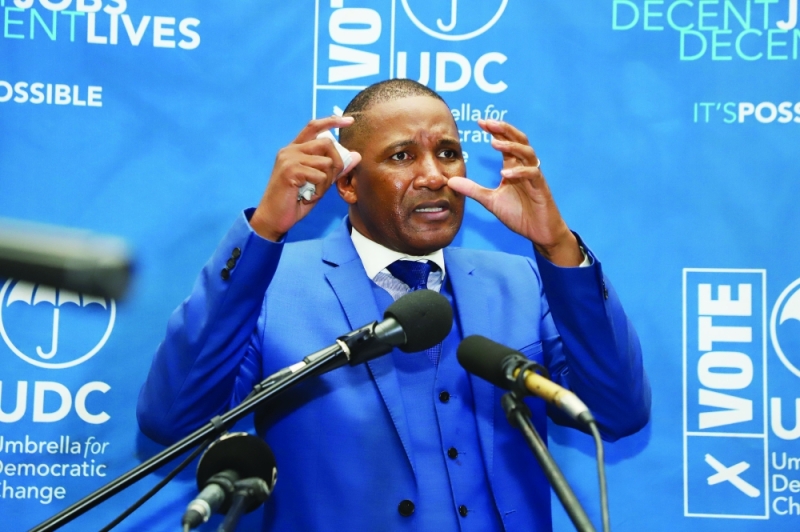Boko blames BDP, local businesses for Moti deal
Mompati Tlhankane | Monday May 22, 2023 06:00


Recent reports from South African media indicated that UDC’s 2019 General Election financier Moti had aimed to capture Botswana and was going to rely on the Botswana opposition as a Trojan horse, by backing Boko’s UDC.
Dismissing the allegations as nonsensical, Boko told the media that the business people who are doing business in Botswana have been so intimidated, brainwashed and are fearful.
He said they will not support opposition parties but would rather fund the ruling party in fear of persecution. He said because local businesses don’t want to help the opposition, fundraising becomes an area where one must look for friends.
He said Moti knew him and trusted that he will do the right thing for his people. Boko clarified that Moti gave him the resources because he is his friend and believes in whatever “you are doing”. “‘Bro you are my friend and I support you. I am not supposed to fund any political party. I am giving my money, my resources to you. What you do wherever is your business’, that’s what Zunaid said,” Boko further revealed. He said that happens when someone is involved in a campaign of the nature that he is and was involved in.
“In the United States there are lobby lists and these lobbies seek to influence decision making by deploying their resources. In our situation when you campaign first you reach out to the members.
You find out how much they can raise and how much you need in the first place to run an efficient campaign, you need quite a bit of money. But whatever little I have, I ploughed it in to this thing not for any return because it is a calling,” Boko pointed out. Since 1966 the lack of state-political party funding in Botswana has drastically swung the balance of competition, often times in favour of the ruling party and to the disadvantage of opposition parties. With money seen as an essential component of the democratic processes, the opposition has always advocated for state funding to promote a level playing field in financing democracy. This un-level playing field in the political game had in the past forced some opposition parties to seek funding from elsewhere and sometimes from foreign donors. Not so long ago BDP legislators wanted to push for a law that would prohibit donations to parties by foreign governments or agencies, foreign persons or entities, organs of state or state-owned enterprises.
The move, which has not yet materialised, was meant to cripple the opposition more ahead of the 2024 General Election considering that the government is yet to give political funding the thumbs up.
The Presidential Commission of Inquiry into the Review of the Constitution last year recommended that political party funding be introduced. The Commission recommended the funding based on parliamentary seats won by parties in the immediate past general elections. They also want parties to be funded at the rate of not less than P50, 000 or such amount as may be determined by Parliament from time to time per Member of Parliament (MP). Boko also said he never had access to $9 400 000. 00 but rather he had access to the ability to mobilise merchandise for the campaign. He said he used his own resources and sometimes uses his children’s school fees to fund the cause.
“These are allegations, unanchored speculations,” he highlighted. According to South Africa’s Daily Maverick amongst the documents are ones purporting to show that a Moti company based in the Seychelles – called Longway Solutions – had entered into an agreement with Boko to fund his election campaign ‘and has to date committed an amount of $9 400 000. 00’. In return according to Daily Maverick, Longway expected “certain commercial opportunities with the co-operation and assistance of the Government of Botswana” in the event of Boko’s victory.
It was also reported that the eye-watering details of the expected opportunities included that the Moti group would be appointed to provide mandatory travel insurance to visitors of Botswana. The group was also to be made chief negotiator to engage with De Beers diamond mining company, which plays a central role in Botswana’s economy. Equally, the Moti Group was to manage border control and security for the country, and undertake business activities in the beef, fuel, lithium and fertiliser sectors.
Commenting on the allegations that he wanted to mortgage the country to Moti, Boko said a country has law on which it operates and these laws are anchored in the ultimate instance on the constitution of the republic. He said the constitution does not vest any powers of that nature the Moti files allege. “There are no such powers because the legislative power in Botswana vests in one entity and that is the Constitution. Section 86 of the Constitution of Botswana gives the power to make laws to Parliament not the President.
Nobody else aside Parliament can abrogate to himself or herself this supreme function of legislating. There is also an Immigration Act that regulates the movement of persons into the country is conducted,” Boko said. “As for negotiations with De Beers, how does an external person, somebody from outside negotiate on behalf of government, what would have to happen? All these allegations are absolute nonsense. None of these things that are suggested could ever be remotely possible.”
